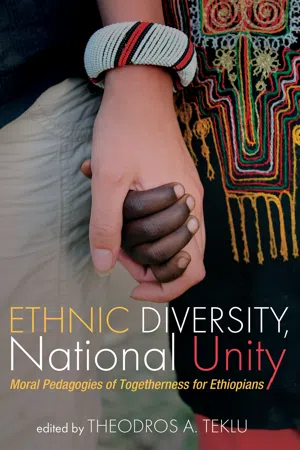![]()
Part I
Interpreting the Signs of the Times
![]()
1
Politics as the Hatred of the Ethnic Other
Theodros A. Teklu
Discerning the “signs of the times” is a prerequisite to any moral-philosophical/theological engagement that aspires to be contextually relevant. Consequently, one should ask, “What is the time?” The question of time produces a descriptive account of our past and present, paving the way for reflection on what ought to be done. In this light, I would like to pose the following critical question: Where are we today in Ethiopia, socio-politically? To anticipate my answer: we are in a milieu of ethnic enmity. Burdened by its political history, Ethiopia, which is home to anthropologically diverse ethno-linguistic groups, manifests a distinctive vulnerability to ethnic-based conflicts. The construal of the ethnic other as a threat and an enemy, which is not necessarily synonymous with the political and legal recognition afforded to ethnic identity in the current Constitution, obliterates the bond of togetherness between people. At present, ethnic-based violence is on the rise, causing security and humanitarian crises. Arguably, such crises are causally related to the crisis in political culture. By “political culture,” I refer to “the values and political conduct of individual or collective agents”—including the participation of the citizenry and not necessarily confined to formal political figures and institutions.
The purpose of this chapter is to articulate the crisis in political culture in terms of politics as the hatred of an ethnic enemy while arguing that the assertion of ethnic identity or diversity needs to be conjoined to the moral responsibility of multiethnic togetherness. To this end, drawing on Carl Schmitt and the contemporary African philosopher and postcolonial theorist, Achille Mbembe, I will start by articulating the concept of the political as the hatred of an enemy. In this light, I will then interpret the contemporary political situation in Ethiopia primarily as a crisis of political culture, in two stages. First, I will offer a cursory review of Ethiopia’s longstanding political culture of alliance/enemy-making, which showcases politics as the hatred of an enemy. Second, I will focus on the current psychic regime of ethnic hatred, which results in ethnic-based hostilities. Admittedly, there are certain coherences and divergences between the traditional form of alliance/enemy-making and its modern appropriation. In the case of the latter, relationships of enmity assume a total feature leading to the extermination of the political enemy while in the traditional system subduing or subordinating enemies was the end goal. Finally, this chapter will draw certain protocols for the future of responsible multiethnic togetherness. Taken together, the introduction of this book and this particular chapter set the agenda for subsequent chapters, which will focus on bringing together ethnic diversity and moral responsibility to contribute towards developing moral pedagogies of togetherness for Ethiopians.
Conceptualizing the Political as the Hatred of an Enemy
Humans are social creatures capable of speech and moral-political reasoning, which distinguishes them from the rest of the animal kingdom. For this reason, political thinkers—ancient and modern alike—consider humans as political animals (politikon zôon). Doing politics involves a rationalization of one’s view(s) about the good of a given group (association) or the common good of society at large. In the process of dialogue, inevitably, there will be differences and contradictions that need to be resolved, affirming the notion that there is no politics without a difference. Defining what constitutes the difference that makes politics possible is, nonetheless, subject to divergent and contending interpretations.
In his book titled The Concept of the Political, Carl Schmitt claims that “the specific political distinction . . . is that between friend and enemy.” A caveat: the political enemy must be a public enemy, not a personal one. For the political to be effective, there must be mutually exclusive hostile people groups, which are ready to enter into war against each other, rendering the distinction between war and politics fluid. Such friend–enemy distinction must result in “association” (among in-groups) and “dissociation” (from people of another group). Willingness to die with and for other members of one’s group is a sign of the utmost degree of association. In contrast, the desire to kill others who belong to the hostile group shows the maximum degree of dissociation. Associations and dissociations may require identity markers based on language, ethnicity, culture, or religion, which instill collective identity that differentiates people groups. Such markers of collective identity and difference become decisive because of their instrumental, not intrinsic, value. Thus, the distinctions are not necessarily essential or substantial, but merely political.
For Schmitt, the political requires ensuring that the boundary of the nation-state clearly defines the distinction between friend and enemy. Who ensures that? For Schmitt, the sovereign dictator or the populist sovereign is the one who—by an appeal to the friend–enemy distinction—homogenizes the community of collective identity and exterminates the enemy both internal and external. The sovereign dictator has the authority to suspend (and even manipulate) law in the name of the state of emergency or the state of exception. Such a suspension of law is analogically likened to the miracle in theology. In Political Theology, Schmitt argues that all theories of the state are secularized theological concepts and that political theorists (Thomas Hobbes and Machiavelli seem to be in view, here) found their approaches in negative or pessimistic political anthropology.
